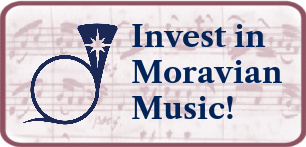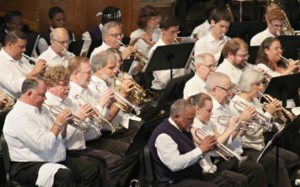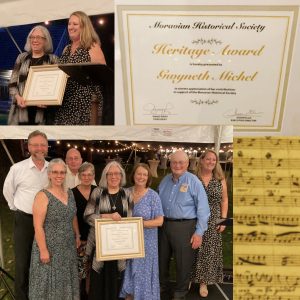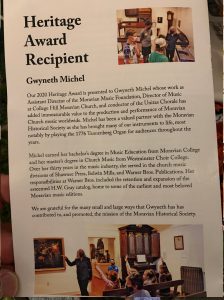Researched by Dave Blum:
I received a message from a long-time friend this morning asking about today’s (April 9) Daily Text reference in Mark 14 to the hymn which Jesus and his disciples sang. I thought the question deserved some deeper investigation and reflection, and more folks would be interested.
We are reminded in Fred Pratt Green’s hymn “When in Our Music God is Glorified”:
“And did not Jesus sing a hymn that night when utmost evil strove against the Light?”
In today’s Daily Texts (April 9) and in the Holy Week Readings we are reminded that: “When [Jesus and his disciples] had sung the hymn, they went out to the Mount of Olives.” (Mark 14:26 NRSV). This is also recorded in Matthew’s Gospel (26:30). So, what was “the hymn”?
The Apostle Paul instructs the church to “…be filled with the Spirit, as you sing psalms and hymns and spiritual songs among yourselves, singing and making melody to the Lord in your hearts, giving thanks to God the Father at all times and for everything in the name of our Lord Jesus Christ. (Ephesians 5:18b-20 NRSV) and a similar wording appears in Colossians 3:16 (NRSV). This would seem to delineate 3 genres sung by the Church: Psalms, hymns, spiritual songs; but we don’t don’t know what those definitions are.
There appears to be no direct corresponding word in Hebrew scriptures for the word “hymn.” Mounce’s Complete Expository Dictionary of Old & New Testament Words provides the Greek words used in the New Testament:
hymneō (verb): to hymn, praise, celebrate or worship with hymns
In Acts 16:25 we read “About midnight Paul and Silas were praying and singing hymns to God, and the prisoners were listening to them,” and in Hebrews 2:12 we see the act of hymning, although the word itself does not appear in the passage: “I will proclaim your name to my brothers and sisters, in the midst of the congregation I will praise you.”
hymnos (noun) a song, a hymn, song of praise to God. The only appearances of this word are the in the Gospel accounts of Matthew and Mark above.
However, there are portions of scripture which allude to early Christian hymns. In some translations you will notice the spacing of the words are different, such as:
“Without any doubt, the mystery of our religion is great:
He was revealed in flesh,
vindicated in spirit,
seen by angels,
proclaimed among Gentiles,
believed in throughout the world,
taken up in glory.” (1 Timothy 3:16)
In the second letter of Timothy is perhaps another allusion to a hymn:
“The saying is sure:
If we have died with him, we will also live with him;
if we endure, we will also reign with him;
if we deny him, he will also deny us;
if we are faithless, he remains faithful—
for he cannot deny himself.” (2 Timothy 2:11-13 NRSV)
Paul writes to the church in Philippi what is regarded as an early Christian hymn:
“Let the same mind be in you that was in Christ Jesus,
who, though he was in the form of God,
did not regard equality with God
as something to be exploited,
but emptied himself,
taking the form of a slave,
being born in human likeness.
And being found in human form,
he humbled himself
and became obedient to the point of death—
even death on a cross.
Therefore God also highly exalted him
and gave him the name
that is above every name,
so that at the name of Jesus
every knee should bend,
in heaven and on earth and under the earth,
and every tongue should confess
that Jesus Christ is Lord,
to the glory of God the Father.” (Philippians 2:5-11 NRSV)
To the church in Ephesus, Paul quotes what William Barclay believes may have been an early baptismal hymn:
“Live as children of light— for the fruit of the light is found in all that is good and right and true. Try to find out what is pleasing to the Lord. Take no part in the unfruitful works of darkness, but instead expose them. For it is shameful even to mention what such people do secretly; but everything exposed by the light becomes visible, for everything that becomes visible is light. Therefore it says,
“Sleeper, awake!
Rise from the dead,
and Christ will shine on you.” (Ephesians 5:8b-14 NRSV)
Barclay writes: “Paul introduces the quotation as if everybody knew it, but no one now knows where it came from…It may well have been part of a baptismal hymn. In the early Church nearly all baptisms were of adults, confessing their faith as they came out of heathenism into Christianity. Perhaps these were the lines which were sung as they arose from the water, to symbolize the passage from the dark sleep of paganism to be awakened life of the Christian way.”
Getting back to the question of what was meant by “the hymn” that Jesus and his disciples sang, it should be remembered this is mentioned in the context of the Last Supper — the Passover meal, which was full of symbolic meaning.
During the solemn observance a group of Psalms known as “the Hallel” were sung: Psalms 113-118. Earlier in the week of Passover, Jesus quoted from one of these Psalms in his teaching:
“The stone that the builders rejected has become the chief cornerstone. (Psalm 118:22 quoted in MT 21:42, MK 12:10 and LK 20:17) So powerful was Jesus’ use of this verse that it was quoted or alluded to in Acts (4:11) and in 1 Peter 2:4,7.
Near the end of the Passover meal Psalm 136, “the great Hallel” was sung, which recounts God’s deliverance:
“O give thanks to the Lord, for he is good,
for his steadfast love endures forever…
who struck Egypt through their firstborn,
for his steadfast love endures forever;
and brought Israel out from among them,
for his steadfast love endures forever;
with a strong hand and an outstretched arm,
for his steadfast love endures forever;
who divided the Red Sea in two,
for his steadfast love endures forever;
and made Israel pass through the midst of it,
for his steadfast love endures forever;
but overthrew Pharaoh and his army in the Red Sea,
for his steadfast love endures forever;
who led his people through the wilderness,
for his steadfast love endures forever;…” (Psalm 136:1, 10-16 NRSV)
During this Holy Week, and as we anticipate a very different and perhaps more solemn celebration of Easter in these unusual and uncertain times, as Green’s hymn concludes:
“…Then let us sing, for whom He won the fight: Alleluia!
Let every instrument be tuned for praise!
Let all rejoice who have a voice to raise!
And may God give us faith to sing always ALLELUIA!”
Dave Blum, MMF Research Librarian






Thank you for your research that gave me the information that I was seeking. I am sure others are wanting the same. Thank you again.
This is wonderful. God bless yo
Thanks to know in my heart,soul and spirit that YESUAH sang a song before going back to heaven
I believe that, after the Last Supper, the disciples exited the room of the Last Supper, came down to street level. The disciples formed a circle, probably holding hands to form a ring, and Jesus moved in a dance in the centre, singing Psalm 136.
Jesus sang the individual verses of Psalm 136 and after each verse the disciples sang the chorus “His Love Endures Forever”, moving around Him in a circle, with Him in the centre.
After they finished the hymn, they went to the Garden of Gethsemane.
Love this